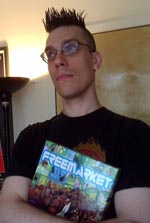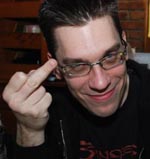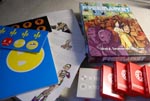Vi skruer tiden ca. 10 timer tilbage. I en kælder på Silkeborg Seminarium er musikken skruet på max, tomme shotglas hamres i bordet, og velskænkede fadøl tømmes. Baren på Fastaval er fyldt, og en del af de 585 deltagere på Danmarks største rollespilskongres fordøjer dagens rollespilsindtryk, mens der drikkes til den store guldmedalje.
Tilbage i hytten på campingpladsen, ca. fem minutters gang fra Fastaval, fortæres brunchen grådigt. De sidste par dages indtryk gennemgås, og slagplaner bliver lagt. I går, fredag, spillede vi vores rollespilscenarie, DK, for anden gang. Omkring 60 spillere har nu været med til at lægge Danmark øde. Mange forskellige historier blev fortalt. Eksempelvis blev Slagelse jævnet med jorden, på Bornholm havde Dansk Folkeparti indtaget Hammershus, mens de lå i krig med en solkult, og i Århus blev en vaccine mod en sygdom ødelagt.
Tallerknerne vaskes op, en ren T-shirt og en deo (det klassiske truckerbad) og så går turen ellers tilbage til Fastaval. For vi har fået en meget spændende aftale i hus: Fastaval 2011 har prominente gæster i form af Luke Crane og Jared Sorensen – to centrale skikkelser inden for indie-RPG. Og dem skal vi nu interviewe! Ude på den store plæne, lidt afsidesliggende under et stort træ, tager vi en lang snak med Jared Sorensen.
Jared Sorensen er, som navnet antyder, af skandinavisk afstamning. Faktisk dansk afstamning, men det ligger langt tilbage. Så på den måde har han ingen relation til Danmark. Jared har spillet rollespil, siden han var 12 år gammel. Men det er som spildesigner, at han er blevet ”kendt” – både inden for rollespil, brætspil og computerspil. Jared har sammen med Luke Crane udgivet Freemarket, som var the hot shit på dette års Fastaval – de solgte alle deres medbragte eksemplarer. Jared bor til daglig i New York. Interviewet er skrevet på engelsk.
America vs DK
Planet Pulp: The difference between American and European roleplaying games/gamers?
Jared: So far not a lot – not as much as you might think. They are closer than they are different. Here at Fastaval we played 15 Men. When we were playing 15 Men our GM was explaining the rules and Luke and I looked at each other over the table and went: Oh yeah, this makes total sense. I could see this be played at US cons.
Some of the weirder scenarios I have seen out there reminds me of Lars von Trier films. Luke is not gonna say it, ’cause he is polite, but I am gonna say it: It seems more like crazy performance art, rolling around in faeces and saying ”I am the world”. And everyone goes: “Wow, that is great, that is really deep.” I am not gonna make a judgement whether its good or not: It touches the border between gaming and performance art.
In the US there is an increased commercial aspect to a ”con”. Here it’s laid back. People are drinking, sitting on the lawn and there is a lot of volounteers. Another difference is the willingness to play games and the willingness to run games that are not your own. The crazy part is: Here is the game I wrote. I am not going to run it but give it to 20 people I do not know with instructions to play it and they are going to teach it to the players. Crazy! That’s a great way to get your games out there.
Gamers in the US tend to be more insulated: They like their game, they go to the con with their friends and play their game there, that they normally play in their living room! Weird: They drive seven hours to play the same game, with the same people, but in a different state.
RPG background
Planet Pulp: What is you background in RPG?
Jared: When I was 12 my aunt Janet, and she is a Sorensen, bought me a copy of Dungeons & Dragons: The Basic Set. But I did not play ’till I was 14. It was out all the time: reading it, reading it, reading it. But I did not understand it at all.
What’s a HD, whats a THACO? I did not get it! But I loved the monsters and the illustrations and read it MANY times. I was obsessed with it long before I actually played it.
The first game I played, when I was 14, was at a campground and it was Ghostbusters. I met this kid who was there. And we played it one night – with our brothers. I was Egon Spengler and we fought a possessed car!
Planet Pulp: When did you start playing ”big time”?
Jared: When I was in college I played a lot, and I mean a lot, of Shadowrun. Every weak for one and half year and then Vampire the Masquearde LARP (live action roleplay, – red). Really heavily when I was 23-24. I played Vampire for years: I planned and played LARPS in New England. I think it was the first LARP group, we existed before the rules came out.
We just said: this could be very cool to do live. We went out in the city late at night dressed out and pretending we were vampires. It was ridiculous and we could have gotten in a lot of trouble – we were also doing our own stunts! It was not the smartest thing to do, but back then we were young and immortal.
The next step
Planet Pulp: And what happened next?
Jared: I grew disenchanted with Shadowrun and Vampire. I talked to a friend of mine I played LARP with, Todd, and said: There’s gotta be more than we are doing. What we were doing was so dry and dull – we could do everything we wanted to and make the rules so why were we stuck?
So I tried to write my own game, Memento Mori, which was a Vampire LARP. You just played what you wanted to play and did not have to follow any rules on character creation. The rule was: You play in the city and you play by night. And everyone had tags to wear and if you saw another player, wearing a tag, they were in the game and you could play with them! Or you could wander by yourself in the city and be a vampire even if no one else was playing.
It was weird, because everyone was telling me that it was not gonna work – they said: ”you need rules”! And I said ”There is a rule: Everybody has to have fun! So if you’re doing something you think is fun but someone else do not think is fun: Compromise so that you are both happy!
Game design the Sorensen way
Planet Pulp: What made you design your own games?
Jared: I moved from Maine to San Francisco and started making my own games. I do remember that I was not happy with the games as they were and I knew I could change things. Not globally, not even in the gaming world, but for myself and what I did and what I could teach people.
I knew there was something else out there but I did not know what! I knew it had something to do with loosing and failure. I got a lot of my inspiration from movies: Schism was inspired by Cronenberg movies, octaNe by Mad Max, InSpectres by Ghostbusters etc. I am not an avid reader, like a lot of gamers are: I will rather watch movies og read comics!
So I started writing games where failure was not bad. Failure drove the story forward. And I remember watching Raiders of the Lost Ark and realised that Raiders and Ghostbusters are very similar: Both are about characters that fail all the time but do not lose. In the end of Ghostbusters: Do not cross the streams, do not cross the streams, but: Maybe we should cross the streams? It does not make sense! And Indiana Jones fails, fails and fails. In the end with the Ark he is tied to a stake. And how does he win? He closes his eyes! If you did that in a RPG you would end up dead. But in the movie it was awsome.
So if you played Indiana Jones you had to make ”being tied to at stake” cool. And I got really obsessed with that. I made this schism: You write down how your character is going to die at the beginning of the game. And after that there was no turning back. It does not matter what came before, but learn from its mistakes and its succeses: gaming is whatever you want it to be if you can figure out to do it! And do not let tradition dictate what you are gonna do in the future! Part of gamedesign is to break the game – remember that. So: use gaming theory and break it down!
The gaming industry
Planet Pulp: What is it like to be a ”game designer”?
Jared: Right now I am a full time unemployed gamedesigner. And I also do computergames! It’s really hard to get work in game designing. Its the job everybody wants, ’cause designing games is the best job, right? But in the gaming industry it’s the job that’s least respected. Its even worse than writing: anybody can write and anybody can do a gamedesign. It’s not well respected unless you are a big name – in which case you can do whatever you want!
I do not what it’s like in Denmark, but in America there is a lot of people who think that if they can find that ONE game it’s gonna handle everything they need. But they do not think that about board games. And video gamers are not like that. But role players are obsessed with the idea that one game can solve all their problems. I thinks it’s OK to play a lot of different games.
I cannot make a game that does not entertain me. I cannot make a game I hate and that I do not wanna play. Because I have to play it: I am a small business guy – I have to run the games on cons, I have to teach people to play and I am gonna talk about it all the time.
What is fun?
Planet Pulp: What if a big company said: make this game?
Jared: I would! But I would make it MY game. Which is probably the reason why I can not get hired, ’cause I am a pain in the ass. I did an interview in October. They asked me some questions about my priorities in game design (this was a computer game).
I ranked, on a scale from 1-6, fun last. And they said: What, why would you rank fun last? And I was: It is stupid to rank it first if everybody does and mostly because fun is NOT the point. I would like to meet the person who could tell me what fun IS and how they DESIGN a game to be fun. Games are made to do something. To shape and mold behavior.
Do you guys have fun play games at Fastaval? I read the descriptions. They do not sound fun. They sound harrowing! And DK – that sounds hilarious! (laugh). Postapocalyptic, eating people, is that fun? That’s not the point. Is it rewarding and does it make you think, does it satisfy some urge, creative aspect and so on? None of those things are fun in itself.
And the company did not like my answer. They said, OK, it’s subjective. Everything is subjective. And I said no, fun is MORE subjective. And I gave them an expample: I would like to take you to a movie – I can promise you it will be a fun movie. Would you like to see it with me? The guy said: What is the movie? And I said: It does not really matter but its gonna be fun. And he looked at me and said: OK, I can see what you mean – I guarantee that my definition of a fun movie is NOT his.
Indie RPG: Past, present, and future
Planet Pulp: It’s been… ten years since the indie movement started?
Jared: Yes. 10 years. It’s insane! Weirdly, we changed the gaming industry. We did not mean to, but we did. The Forge was making, I guess in 2004-2005, 42.000 dollars. For a bunch of guys who photocopied and stapled together little role playing games and selling PDF.
In the beginning, with PDF, people were like: no one will pay for a document they download from a website. And they are not gonna pay ten dollars, are you crazy? InSpectres was ten dollars for a PDF and people were like: there is no way they are gonna pay ten dollars for a PDF – for a book that only costs 20! I just said: People ARE buying it, so you are wrong. And now everybody is doing PDF.
Independent games is huge. PDF’s, print on demand, PayPal: you can start your own gaming company with your laptop, a cup of coffee and 100 bucks on your PayPal account. You used to need 20.000-30.000 dollars to get started – to print the books, to send to the press, distribution and so on. So I think the indie movement is going to increase. It’s much easier today to start on your own.
Planet Pulp: So the technology is the answer – if the technology had been there 20 years ago it would have started there?
Jared: Yeah. People have been making indie games FOREVER. Greg Porter has been making games forever, Macho women with guns – that game is almost as old as I am (spillet er fra 1988, så Jared rammer lidt ved siden af, – red). The only difference is distribution and production – today it’s a lot easier to get into.
Today there is ONE big game comapany and a lot of small ones. Green Ronin, that by my standard is gigantic, but only a fly on the butt of Wizards of the Coast, no offense Chris, I do not think your games are butt (Chris Prames, Green Ronins Publishings grundlægger i 2000, – red) . And then there is me. And I am nothing. And there are people that sell 10 copies. We are all making games. And hopefully learning from each other, though we do it for different reasons. We need people in the hobby to drive it forward, ’cause else there will be no hobby.
The Crane/Sorensen connection
Planet Pulp: How did you and Luke Crane hook up as gamedesigners?
Jared: Luke and I originally met at GenCon about six or seven years ago. And I was not impressed with mr. Crane. He was this bald guy, kind of nerdy, nerdier even than me. I knew he liked heavy metal bands and he had made this weird fantasy game. And I thought: Another one. But his friend, a Polish metal guy who also was into industrial, he was cool! We talked a lot about bands, and then there was this Crane guy in the background, and I did not want to talk with him because he was lame.
But eventually Luke and I was at a panel together at a con and we bonded over a mutal hate against the roleplaying hobby! OK, just aspects of it and not the entire hobby. We realised that we pretty much did the same thing, but with different ends: I am doing crazy post modern roleplaying games and he is doing crazy, gritty medieval fantasy. And then we were friends!
We were hired by Peter Adkinson, the guy who originally published Magic the Gathering, and his new roleplaying company to do this crazy game. And we have been working ever since. And that game is Freemarket. But now we are publishing Freemarket ourselves. We got the rights when we got fired.
It was an interesting conversation when he fired us at GenCon. He said: “I am sorry it did not work out”. We said: “Yeah, we got at letter from the company that said we were no longer ‘full time employees’. What did that mean?” He said: “It means you are not working here anymore.” It was an awkward conversation, but we ended as friends and he gave us the rigths for Freemarket.
Planet Pulp: Was it designed to be published big time?
Jared: It was designed to be a very different thing. What we designed was a prototype. Now it’s published. We have a PDF of the rulebook, but it has cards, tokens etc. It’s a resource intensive game. One reason we did that was that we wanted a kind of cool board game feel when you open the box. It looks cool, and it’s harder to pirate! If we do this big production we do not want people to steal it.
And as much as I like freedom and the idea of everything should be free, this is how I make my living. And if someone takes my game and gives it to his friend online, and that person does not pay for it and plays it: It’s not stealing from me directly but it’s definitely not helping me. And if they like it why not help me? If you are into my work then pay – you are not paying for that game but for the next one! I have to stop if I do not sell any copies and I would have to stop making games. So: People who pirate music and games: SUPPORT YOUR ARTIST. Help them because what they are doing cost them lots of time and money.
Planet Pulp: Freemarket is limited to 1000 copies. Is it sold out?
Jared: No, no. Not by a long shot. And 1000 copies is not a lot. A lot in modern indie RPG’s is 2000-3000. If you did 5000: Very good. 10.000 and you have a hit. Over 10.000 is a smash hit. The people that make money in the RPG business are the printers and the distributers. If we sell for 150.000 dollars, Luke and I would each pocket 14.000. And that’s before taxes! So 20-25 % of it is gone. And that would be the numbers for a hit.
So if you want to live from it you have to sell a lot of hits. If you want to make money then become the publisher. But we like doing it. I guess we are stupid and idealising/romantic artist types. We are gonna starve, but, damn, we are gonna make good games!
Efter interviewet trængte vi til en kold indie-fadøl før vi kastede os over Luke Crane. Og det interview kan du læse i næste måneds udgave af Planet Pulp!
Udgivet i nr. 68 | 13/06/2011





